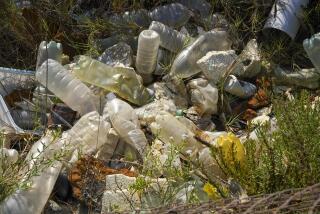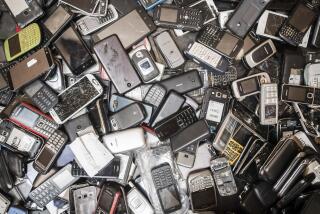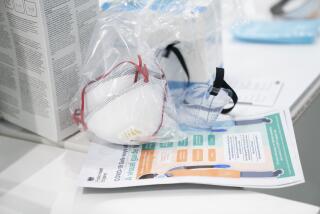Medical Reuse Rules Proposed
- Share via
In response to growing concerns over the safety of disposable medical devices that are reprocessed for reuse, the U.S. government Monday proposed highly anticipated measures to more strictly regulate the practice.
The Times last summer reported that millions of medical devices that come in contact with blood or other body fluids and are supposed to be discarded after one use are, instead, reprocessed and reused in other patients without their knowledge.
About 1 million disposable devices are reprocessed every year in the United States.
Reports stored in government files document malfunctions related to reprocessed disposable devices, such as cases of cardiac catheters with tips that have broken off inside a patient’s heart, The Times reported. Other incidents include infections caused by presumably non-sterile devices, as well as adverse patient reactions to bacterial toxins left over from cleaning the devices.
The situation is most critical at hospitals, which often lack guidelines on how to reprocess a device. About one-third of all hospitals use reprocessed disposable devices, according to a recent survey.
But until now, much reprocessing has gone largely unregulated, and members of Congress are pushing the Food and Drug Administration to crack down, contending that no one really knows which devices are too risky to reuse.
On Monday, the FDA announced its action plan, a move long awaited by members of the medical device manufacturing community.
Under its proposed strategy, the FDA will classify disposable medical devices into three categories: high, moderate and low-risk devices.
High-risk products would be those deemed risky from evidence of potential safety hazards or because the device won’t work after repeated re-sterilizations. The FDA would ban reuse of these devices.
Moderate-risk devices would be those that are cause for concerns but for which there is no actual evidence of patient harm. Reprocessors would have to collect additional safety data on reuse of those devices, and the FDA would establish safe reuse standards. Some plastic devices would possibly fall into this category because they can withstand heat re-sterilization but disintegrate if cleaning chemicals are used.
Extremely low-risk devices could continue to be reused. But unlike today, hospitals that choose to reprocess those would have to register so the FDA knows who is doing what.
The FDA hasn’t decided which devices fall into which category. It will hold a public meeting on Dec. 14 for industry and doctors to react to the proposal and help provide evidence about risk.
But the agency has hinted at some concerns. For example, FDA scientists recently tested heart angioplasty balloons and discovered that reused balloons can harbor dried blood and become so stretched that they don’t inflate properly. But some infection control practitioners have said those tests did not mimic a “real life” cleanup procedure, raising questions about the tests’ validity as a measure of risky devices.
Larry Kessler, FDA’s chief of device surveillance, anticipates that the number of high-risk devices will be small.
“Right now, there’s a lot of emotion about this,” he said. “We need good, credible science to make the decision.”
Reprocessing is usually done by hospitals or third-party reprocessing companies. Hospitals argue that managed care pressures have forced them to cut costs, and that regulating reprocessing will hurt them even more. Reprocessing companies say evidence of any harm is scarce, and that there is no clinical evidence that patient safety has been jeopardized.
Monday’s announcement is a first step, but the FDA needs to ensure “that reprocessed devices be as safe as new devices,” said Melissa Merz, spokeswoman for Sen. Richard Durbin (D-Ill.), who has pushed for FDA action. “The fact remains that Congress needs to go further to ensure patients are informed before a recycled device is used on them.”
In California, Assemblyman Thomas Calderon (D-Montebello) recently announced the introduction of a bill to temporarily ban the use of reprocessed devices.
The American Hospital Assn., which contends that many hospitals recycle devices safely, declined to comment.
*
Associated Press contributed to this story.






